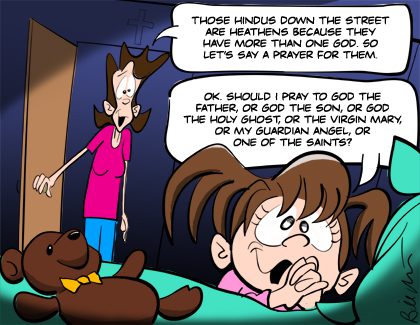
By John Loftus, Debunking Christianity, Does God Exist? A Definitive Non-Philosophical Biblical Case
Note: For those unfamiliar with the term henotheism: henotheism is the worship of a single, supreme god that does not deny the existence or possible existence of other deities. (Wikipedia)
When we take the Bible seriously we discover a significant but unsuccessful cover-up about the gods we find in the Bible, who evolved over the centuries from polytheism to henotheism to monotheism.
Let’s look at Genesis 1. I’ll make 7 points about the first two verses, usually translated like this:
In the beginning God created the heavens and the earth. Now the earth was without form and void, and darkness covered the surface of the abyss, and the Spirit of God was moving over the waters.
First, This is not describing the absolute beginning of time! The word “the” in verse one, “In the beginning” is not there.
Better Translations:
- When God began to create the heavens and earth. (NRSV)
- In the beginning, when God created the heavens and the earth. (New American Bible)
Second, Genesis is not describing a creation out of nothing! Instead, it’s describing the making of something from pre-existing matter.
This is stated well by a translators note in New English Translation (NET):
Genesis itself does not account for the original creation of matter. The ‘heavenly/sky’ did not exist prior to the second day of creation, and the ‘earth/dry land’ did not exist as we know it, prior to the third day.
Genesis 1 begins ominously. What exists is a formless empty earth, hidden beneath a darkened watery chaos.
Third, Genesis 1 is not describing the origin of heaven where the saints go when they die! It’s describing the origin of the “skies” above us.
Fourth, Nor is it describing the origin of the planet earth, since it hadn’t been discovered yet! It’s describing the origin of “dry land”.
Fifth, Nor does the “Spirit of God” move over the waters! The word used can be translated “spirit” or “breath” or “wind” because the ancients believed wind came from the breath of their gods. It’s best translated as “the wind of God”. We no longer attribute the wind, or hurricanes, to God’s Spirit or breath.
Sixth, Who was making the world in Genesis chapter one?
It was Elohim, a plural word for “gods”. Dr. Randall Heskett: “Elohim, even after monotheism, still includes the heavenly hosts, who are part of the divine council.” Heskett is an Old Testament and Hebrew scholar. This includes “the sons of god” (Job 38:7). Elohim says, “Let us make man in our image” (Genesis 1:26), which includes these celestial beings. More on Elohim directly below.
Seventh, The word “abyss” is misleading, since what is being described in Genesis 1:2 is not just vastly deep and darkened waters. It’s describing a primordial “chaos” which is being manipulated and maintained by mischievous chaos gods! More on chaos gods after we first look at Elohim.
So here is a better translation of Genesis 1:1-2:
Elohim made the skies and the dry land, beginning with land that was without form and void, with darkness covering the surface of the chaos, with the wind of Elohim moving over the waters.” The original grammar is a bit difficult to translate. If nothing else, consider this a slightly interpretative translation using corrected wording.
I could use the word “God” instead of Elohim since the verbs indicate a singular male God. (i.e., “God he said ‘Let there be Light…’”). It’s just that it’s more complicated than that. Dr. Heskett suggested “In the beginning, when the henotheistic god—who became a monotheistic god but kept his henotheistic name—created the heavens and earth.” He adds, “elohim is the resonance of henotheism, before the move to monotheism.”
Bruce Gerencser, 66, lives in rural Northwest Ohio with his wife of 45 years. He and his wife have six grown children and thirteen grandchildren. Bruce pastored Evangelical churches for twenty-five years in Ohio, Texas, and Michigan. Bruce left the ministry in 2005, and in 2008 he left Christianity. Bruce is now a humanist and an atheist.
Connect with me on social media:
Your comments are welcome and appreciated. All first-time comments are moderated. Please read the commenting rules before commenting.
You can email Bruce via the Contact Form.

 …before Israelite religion denied the existence of other Gods than Yahweh, it went through a phase of granting their existence but condemning their worship (by Israelites, at least; if the Moabites wanted to worship Chemosh, that was their business). In technical terms, Israelite religion reached monotheism only after a period of “monolatry” — exclusive devotion to one god without denying the existence of others.
…before Israelite religion denied the existence of other Gods than Yahweh, it went through a phase of granting their existence but condemning their worship (by Israelites, at least; if the Moabites wanted to worship Chemosh, that was their business). In technical terms, Israelite religion reached monotheism only after a period of “monolatry” — exclusive devotion to one god without denying the existence of others.